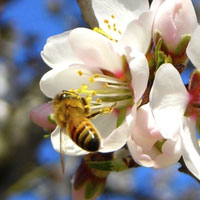
| Ontario Moves To Protect Bees | 19 July 13 |

Source: bees.chrisinch.com
There are about 80,000 bee hives in Ontario, operated by some 250 professional beekeepers and another 4,000 hobby beekeepers. In 2012, over 6 per cent of bee colony populations were lost, and beekeepers and environmentalists are now calling for a ban on neonicotinoids, much like the one just introduced in Europe. The Ontario Beekeepers' Association, Sierra Club Canada and the Green Party are pushing for a federal ban. "It's like a game of roulette now ...nothing stops the bees from being in contact with the pesticides," says association spokesperson Tibor Szabo. Corn farmers will have a different view. A bee health working group is being formed by the Ontario gorvernment to make recommendations on how to mitigate the potential risk of a certain pesticide to honey bees. The group will comprise beekeepers, farmers, people in agri-business and scientists as well as staff from federal and provincial agencies View July 9, 2013 Maclean's articleView July 9, 2013 Huffington Post article View July 5, 2013 Toronto Star article View May 31, 2013 Ontario Beekeepers Association article View May 13, 2013 Toronto Star editorial View May 6, 2013 Toronto Star article View April 2, 2013 Alliance for Natural Health article |
|
 Print version Print version |
Top |
